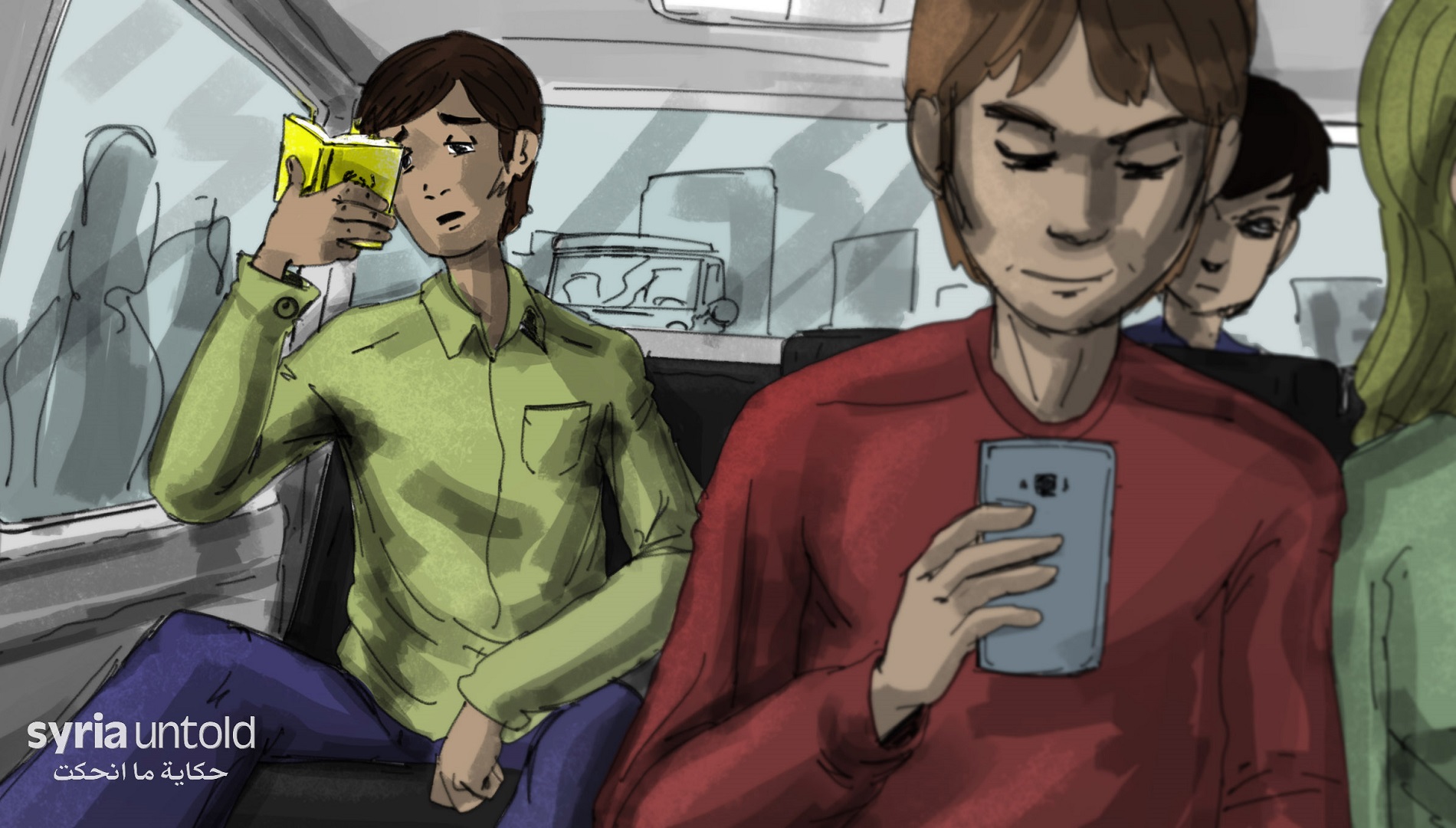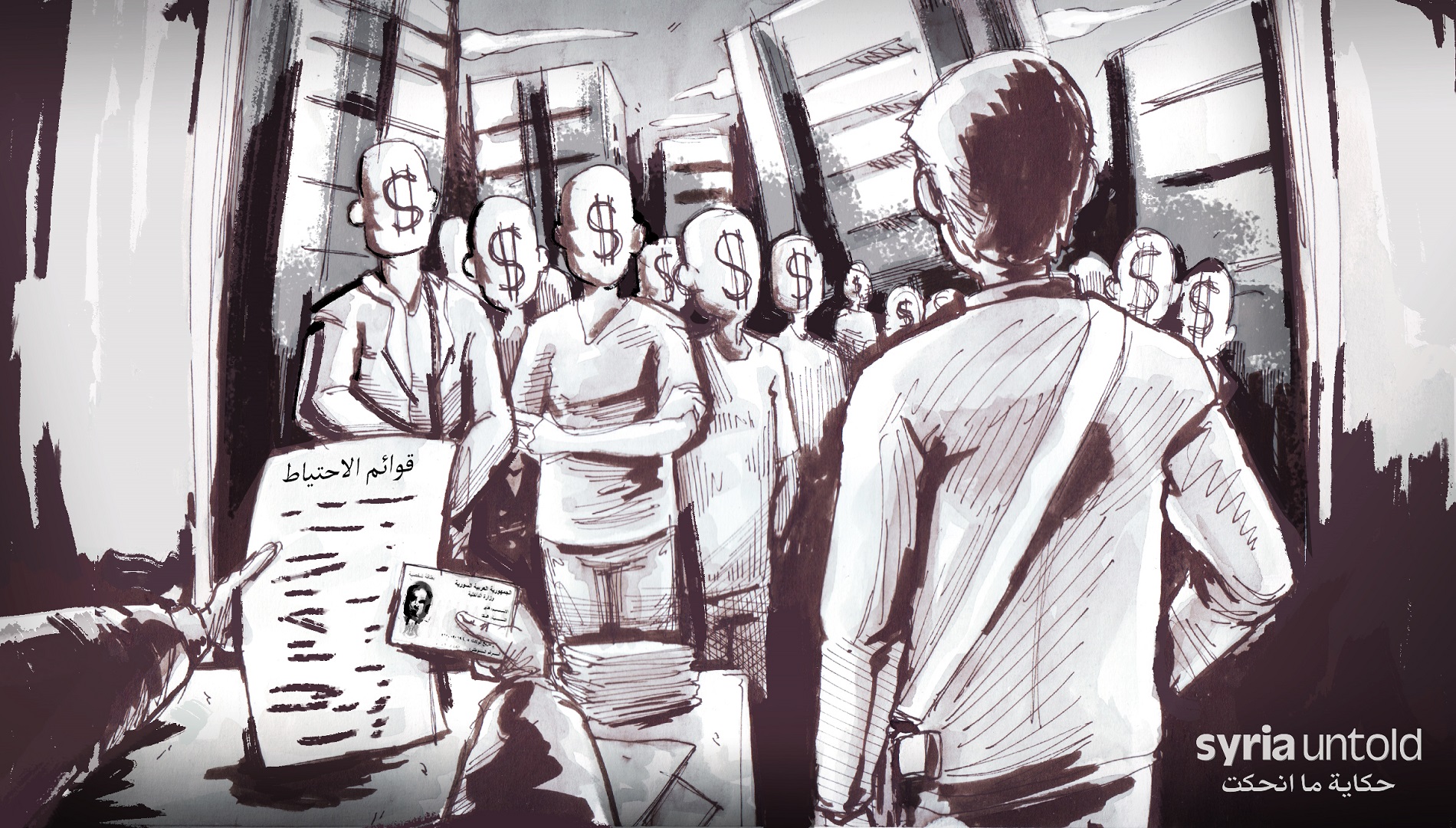The idea of being called up to rejoin the reserve force continued to worry Hassan in 2014, although the 32-year-old man from Damascus had been discharged two years earlier.
Hassan had joined the army by the end of 2010. At the time, military service was compulsory and thus inevitable. Yet, it only meant that young men would waste two years of their lives. They would otherwise spend those two years studying and building a career or a family. As a matter of fact, Hassan was still finishing an economics degree, he was in the fourth year of studies. His parents being traditional, they arranged for him to marry a nice girl from another traditional family only months before he joined the army. Hassan was as traditional and as religious as his parents, so he did not resist the arranged marriage. He decided to put his studies on hold because military service was unavoidable. He decided to complete it sooner than later, especially since he had no children of his own yet or a fixed job.
Committing murder for 50 dollars!
Things, however, did not go as Hassan planned. Few months after he had joined the army, protests broke out in Daraa, Homs, and other parts of Syria. To his misfortune, Hassan was serving in Homs and had to participate in containing the protests in several villages of the area in 2011. He used to avoid opening fire on civilians through intentionally missing the target because he knew very well that disobedience would lead to summary execution in the field.
He witnessed an incident where one of his colleagues who murdered more than 20 protesters received a financial reward from the army’s administration amounting to 3,000 Syrian pounds or $50 at the time. Hassan recalled how he felt in those difficult days, “the military orders did not terrify me as much as seeing that man’s reaction when he received the money. He felt no guilt. If anything, he became more violent and more willing to kill, although he never received another reward later. He died while fighting against the Free Syrian Army (FSA) a year after the incident.”
Hassan’s service ended in early 2012. By then, the protests had turned into an armed rebellion and the government started losing control over many areas. Luckily, he was discharged just in time to avoid serving during the open war between the regime and the opposition which started when the armed opposition forces seized areas in Aleppo in July 2012. He discharged just before the war expanded and engulfed half of Syria, which meant a policy of extended periods of active duty for all those who are doing their military services was introduced.
However, his luck seemed to run out, and he wasn’t spared the ordeal of displacement. Hassan and his wife were living at the time in a small house in Babbila, a suburb in Rif Dimashq governorate. By the second half of 2012, the couple had a daughter, and Hassan admits it was definitely not the best time for having children.
Hassan said, “after my daughter completed her first month, clashes broke out and shelling hit the area. We fled the war leaving everything behind. I kept my savings and wife’s jewelry. They were not much, but they were enough to help us rent a house in the capital for some time. We rented out in Ad Dukhaniyah in Rif Dimashq for around a year and a half until the town turned into a battlefield overnight in September 2014. We moved again, but, this time, we took nothing. We did not even have the time to gather our identification documents. My wife took a brush to comb our daughter’s hair on the way. I did not understand how she chose the brush out of all things, but the situation paralyzed our thinking. We only started to understand what has happened after we arrived at the house of my in-laws in central Damascus.”
The fear of reserve lists
The battle in Ad Dukhaniyah ended swiftly, the regime regained control over it but the battle left behind unspeakable destruction. The town was almost entirely cut off from services. The fighting had also stopped in Babbila, where Hassan owned a house. Babbila was by then subject to a reconciliation agreement between the regime and the armed opposition. Still, Hassan had no intention of going back there, so he rented out a place in Jaramana in Rif Dimashq. Towards the end of 2014, his name reappeared on the army’s reserve lists.
He stopped going to work as the head of finance of one of the small companies and tried working from home as an independent audit. He used to audit accounts and charts of his clients, and his brother in Damascus would gather the fees from clients. He would later hand them to Hassan or his wife every time he visits them.
Hassan’s brother was an Arabic language teacher in his 50s, his age meant he was not going to be called up for the reserve. This gave him the ability to move freely in Damascus and pass through the checkpoints who tended to be lenient because he had a card that showed he was employed by the state, and thus posed no security risk.
Meanwhile, Hassan kept his movement to a minimum and always remained in the neighbourhood. He was skilful and excelled at avoiding both permeant and temporary checkpoints installed to search for those evading military service. Even when boredom tested his patience and he felt trapped, he never gave in to the temptation of going out of the house and strolling the beloved streets of old Damascus. Because he was home all the time, the fights with his wife became more frequent, and they both fell into a severe depression. That was still better than becoming a soldier in a devastating war where chances of making it alive and without permanent physical or emotional damage were very low.
Life between rumors and despair
Four years is a long time. Hassan kept on hoping every time he heard rumors about a possible amnesty for those wanted for reserve military service or about a round of international talks that could put an end to the war. This would mean that the government would no longer have the pressing need to recruit all young men in its military operations.
He explained, “After having spent more than two years in hiding, I experienced moments of great despair when I considered turning myself in. But seeing my wife’s and my daughter’s tears prevented me from doing so and helped me to think rationally about the risk. By then, my daughter was old enough to understand what was happening around her.”
Mental health specialist Leila Nasseh (pseudonym) considers the state of incapacitation that many men have experienced as a result of their inability to move freely and fulfil their roles as breadwinners caused a great shift from the traditional lifestyle of Syrian society. It also increased the rate of divorce and, in some cases, the rate of domestic violence against women. Most traditional Syrian communities do not accept the idea of men staying in the house while women work to provide for the household, especially since this change did not come as a result of the natural evolution of ideas and traditions. Instead, it happened because men were targeted and faced very complex and difficult decisions.
Living free
The acceleration of events at the start of 2018 gave hope to Hassan’s small family. Once the regime regained complete control over Rif Dimashq, Damascus was declared a zone free from military operations. That included Babbila, the opposition remained in the neighbourhood in the years before based on a truce between them and the government but by 2018 the opposition in all of Rif Dimashq has surrendered the areas back to the control of the regime. There was hope indeed, yet it was not until the end of 2018 that the newfound hope became a reality. In October, a presidential decree granted an amnesty to those evading conscription. This included amnesty for the names on the reserve lists. Hassan checked with different sources and made sure that his name was removed from the reserve lists. The news he received of men who came from abroad and got arrested at the airport or border still made him paranoid. He also heard rumors about some people whose names were removed from the reserve lists only to reappear on them again a short while after. Yet, Hassan was fed up with hiding, so he decided to live a few normal days. He wanted to accompany his wife and daughter out to walk the streets he loves and take public transport that he missed despite its flaws. He wanted to get groceries himself instead of sending his wife, and to visit the friends and relatives he had not seen in a long time. What could happen next was the least of his concerns now.

In a little over a month, Hassan caught up on everything he had missed out on from the gossip and the news of friends. Every couple of days, he would go to his favorite movie theatre, walk the streets of Al-Hamidiyah market, Bab Tuma, and Al-Qaymariyya. There, he had the famous croissant with his daughter and the hummos fatteh dish, and he bought her everything she fancied. He held his wife’s hand in the street for the first time in a long time and enjoyed a tea with her at Al Nawfara coffee shop which was packed with men. His old fears pushed him to enjoy every second of freedom.
Freedom restricted
In the beginning of 2019, Hassan was stopped at a military checkpoint while on his way to a job interview, and he was informed that his name was put on the reserve lists for military service again. He told his wife and brother, and he was taken to a branch of Military Security in his neighbourhood where he spent several days. The place was packed with mainly drug addicts and dealers and some men evading military service. Nothing clearly explained why military security was handling drug related felonies, except maybe that the number of such felonies has increased so much that it exceeds the capacities of the police stations. Hassan could not find any justification for being locked up with criminals when he was not officially notified of his name being listed again for conscription. Trying to make sense of what was happening was a futile mental exercise.
The Damascus-based attorney A.S. believes, “The amnesty that the regime granted to those escaping conscription was only to give them a false sense of security. Remember that the regime didn’t break any law by recalling these names after granting them amnesty. The law allows the regime to request the same men for military service at any given moment.”
Most men who had been avoiding military service for the past few years were so financially and emotionally exhausted that they no longer cared about the possibility of the regime ambushing them. Meanwhile, some of them used the short period between the amnesty and the time by which their names were reenlisted for the reserve and were able to take measures to protect themselves from conscription again. Some resorted to paying bribes to be exempted, while others registered in higher education which legally gives them the right to postpone being drafted.

Hassan cherished the memories he shared with his family when he was free, and it helped him get through his detainment. He felt a bit lucky when he was sent to a quiet neighborhood in Daraa which had been under the control of the regime forces since 2018. Some incidents worried him, as some officers and checkpoints were randomly targeted. However, the current situation was nothing like the past as he could go on leave whenever he wanted, and he was not compelled to carry a weapon since he arrived.
He explained “right now, I feel that my wife is more comfortable than before although she only sees me twice a month. The new situation has restored passion in our relationship. It is not the best scenario for us, but at least it is less stressful than the time I was confined to home. Maybe, this is the best time to serve with the army as the worst has passed. Let’s hope at least.”




